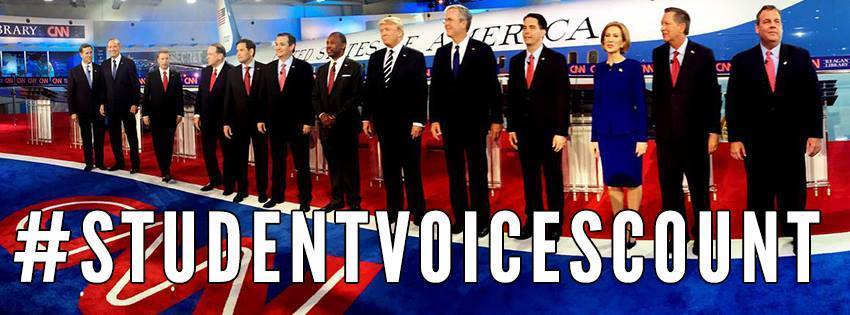When it was announced that only 50 students would receive tickets to the GOP debate that will be held at the University of Colorado on Oct. 28, a group of students banded together in an attempt to make something good out of the bad news. That group calls themselves Student Voices Count.
On Monday, Student Voices Count launched their first funding campaign. The group hopes to grow their movement by printing T-shirts and stickers, which they will use to further promote their initiative.
The group describes itself as “a non-partisan national movement of CU students and supporters who stand in solidarity.” They started as a group of 13 and that number quickly grew to 50. Currently, they have gained close to 1,000 followers on Facebook and aim to have 10,000 by the time of the debate.
If CNBC and the Republican National Convention do not allow for students to make up a larger portion of the debate’s audience, Student Voices Count aims to have 10,000 people peacefully gather outside the Coors Events Center on the night of the debate.
“We are not a protest; we are a movement,” said co-founder Aaron Estevez-Miller.
The organization’s goal is not to disrupt the debate, but rather to make the presence of the student body visible to the media, the university and the public, according to Estevez-Miller.
Student Voices Count is coming up against a difficult opponent in CNBC, the network in charge of organizing the debate.
“CNBC told us, ‘We hate audiences,’” said Boulder County Republicans Chairwoman Ellyn Hillard. “They are worried about security, and they wanted the audience to be as small, predictable and vetted as possible.”
In working to achieve their ultimate goal of convincing CNBC and the RNC to make at least another 900 tickets available to students, the group has challenged the notion that the current generation of students is politically apathetic.
“We believe the strength and size of the Student Voices Count movement has already proved [that idea] misinformed,” said Estevez-Miller. But the group still feels that more needs to be done.
“We are concerned with the increasing intersectionality between politics and entertainment, and the disengagement of millennials from the political process,” the group said on its Facebook page.
To exemplify and encourage student involvement in the political process, Student Voices Count has collaborated with BE HEARD!, a non-profit, non-partisan, millennial-run news organization based in Colorado. They plan to have their own live broadcast during the debate, during which they will discuss issues facing the millennial generation.
Contact CU Independent News Staff Writer Ryan Ellis at ryan.ellis@colorado.edu.

